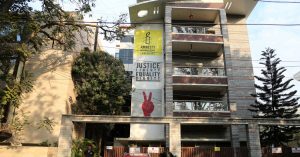WEST LAFAYETTE, IN — Purdue University recently hosted Benjamin Crump, attorney for George Floyd’s family, who spoke at a virtual campus event where he allegedly compared parole officers to slave masters.
The discussion was held Sept. 10 and moderated by Venetria K. Patton, head of the School of Interdisciplinary Studies and professor of English at Purdue University.
White supremacy trickles into EVERYTHING we do, even our elections. The BLACK vote has been suppressed for FAR too long due to white supremacy. We can NOT compromise – Reclaim YOUR elections & VOTE this November! pic.twitter.com/zO4XJtSArc
— Ben Crump (@AttorneyCrump) September 12, 2020
Crump was invited to discuss his professional experiences as an attorney surrounding racial injustice and inequities in the U.S. according to the university’s registration page for this event:
“Through a steadfast dedication to justice and service, renowned civil rights attorney Benjamin Crump has established himself as one of the nation’s foremost lawyers and advocates for social justice, earning the nickname ‘Black America’s Attorney General.’
“His legal acumen has ensured that those marginalized in American society are protected by their nation’s contract with its constituency. With the heartbreaking murders of unarmed Black citizens, America’s conversation about racial equity has become a global movement.
“At the heartbeat of that movement are the families seeking justice. Crump represents the families of George Floyd, Breonna Taylor, Ahmaud Arbery, Trayvon Martin, Michael Brown, Tamir Rice, Nakia Jones, Danny Ray Thomas and Stephon Clark, as well as the residents of Flint, Michigan.”
According to Bloomberg Law, Crump has worked on nearly 300 civil rights cases since beginning his career in 1996, including those of George Floyd, Breonna Taylor and Jacob Blake.
Crump has also represented people affected by the water crisis in Flint, Michigan and the Johnson & Johnson baby powder lawsuit.
Our TWO justice systems allow this white man, who tells police he WILL resist, to get out of the situation scratch free. Meanwhile Black & Brown Americans everywhere get tased, shot, & KILLED in minor situations. What a DISGUSTING juxtaposition. We want FAIR and EQUAL treatment. pic.twitter.com/DRvKK76UaB
— Ben Crump (@AttorneyCrump) September 19, 2020
According to Campus Reform, Crump mainly focused on the current U.S. legal system, specifically claiming that it “is killing you softly,” referring to how charges are laid out against minority youth in a deliberate fashion across the nation:
“They are killing our children with these trumped-up felony convictions.”
It’s disappointing we still need to educate some ignorant educators like this one. #GeorgeFloyd‘s life mattered and Black Lives MATTER. Teachers need to stick to FACTS and kids shouldn’t be taught hatred in schools. pic.twitter.com/HozjpKbjKi
— Ben Crump (@AttorneyCrump) September 28, 2020
When asked what advice Crump would give young minority youth, he reportedly replied:
“There is not if you’ll get stopped by the police, it’s when they’ll be stopped by the police.”
Crump also spoke about the police involved with the Jacob Blake incident as “having deliberate indifference as to whether this young black man lives or dies.”
“Black teens, 16 & 17 years old, were 9x more likely to encounter police enforcement in 2018 than their white counterparts.”
This is UNACCEPTABLE. Unfortunately, implicit bias plays a REAL role in policing. This is why we need proper training and reform! https://t.co/HffPavmGHq— Ben Crump (@AttorneyCrump) September 28, 2020
Campus Reform also reported Crump compared a probation officer with a slave master:
“The psychological effects of having to report to a probation officer, on a monthly basis, is almost like having to report to the slave master.”
In a discussion about the prison system, Crump compared prison labor to slave labor, saying, “even though the 13th Amendment freed the slaves, what was the caveat? It said ‘except for punishment for crimes.’”
UNTIL Black people are afforded the same rights as whites…
UNTIL our lives are valued equally…
UNTIL we stop seeing Black people as dangerous & criminal…
UNTIL we stop excusing police brutality…
There will be NO JUSTICE & we will know NO PEACE.
(🎨:@Denny_ow4real) pic.twitter.com/s9TyFC9Cvy— Ben Crump (@AttorneyCrump) September 25, 2020
According to Campus Reform, Crump also discussed the war on drugs and said “it was a way for them to conspire to discriminate, to make sure the people they wanted to be younger, stronger slaves in the prison industrial complex to be achieved.”
Internet connection difficulties were another issue he discussed and allegedly suggested that affluent communities did not experience problems that marginalized ones did:
“The fact that once this current administration came into power, you had the federal FCC did all the kind of deregulation that did not require the same level of broadband infrastructure go into more socioeconomic communities mainly, marginalized communities, but rather it went into more affluent communities based on different zip codes.”
Crump seemed to suggest that cutting off access to the Internet was intentional as it was “akin to where they would tell slaves back in slavery, where they couldn’t read.”
When discussing the presidential election, Crump said Republicans are attempting to suppress minority votes:
“For years and years that’s what Republicans would do, because now that Democrats and minorities are starting to get into the game, they are saying ‘no, that mail-in stuff is fraudulent, it’s not reliable. We gotta not allow it so we can suppress the vote and marginalize their effort to turn out to vote.’”
In a separate interview with Bloomberg Law, Crump explained how he chooses the cases he represents:
“As many cases as I have, we turn down probably 95 percent of the calls we get. I take cases that not only will have an impact on the individual and their family but will have impact on society and impact many people.
“Like the George Floyd case, like Breonna’s case where it shocked my conscience, and I say, ‘We have to do this case, because it’s not only going to impact this family, it’s going to impact multiple families and communities of color and marginalized communities.’
“That’s what I did when I got involved in the Flint water crisis and when I represented Jannie Ligons and other women who were raped by an Oklahoma City police officer.
“Those cases are going to have a larger impact beyond just that individual. With the rape case, it really was about black women being sexually assaulted by police officers.
“I knew if we took on the case and focused attention on it, it would bring more attention to a larger issue.”
Crump also explained his strategy as a civil rights lawyer:
“It is certainly emotional on a high level. And you do think, as you lay in bed at night, about trying to guarantee some justice for these families. As a civil lawyer, technically all we can do is bring a civil rights lawsuit or wrongful death lawsuit and recover money, which we have done on every case. We’ve never lost one of these civil rights cases.
“We try to influence the criminal aspect, but the only people who can charge citizens and take away their liberty and put them in prison [are] the district attorney and the prosecutors. So you try to do everything in your power to influence the court of public opinion, so that hopefully, we’ll make the prosecutors do what they have never done in America, and that is hold police accountable for killing minorities.
“I got this nickname, Black America’s Attorney General, and I take it to heart because I am trying to fight for minorities to have equal opportunities and the American dream, as well as equal access to justice. We want all our citizens to be able to have equal justice under the law.”
Crump founded his law firm, Ben Crump Law, in 2016, and expanded it to 13 cities with a dozen attorneys and counsel relationships with 50 more.
—
Want to make sure you never miss a story from Law Enforcement Today? With so much “stuff” happening in the world on social media, it’s easy for things to get lost.
Make sure you click “following” and then click “see first” so you don’t miss a thing! (See image below.) Thanks for being a part of the LET family!



















